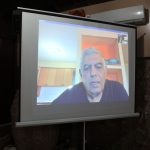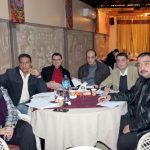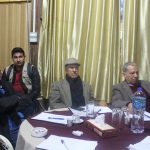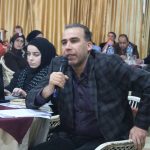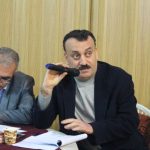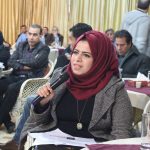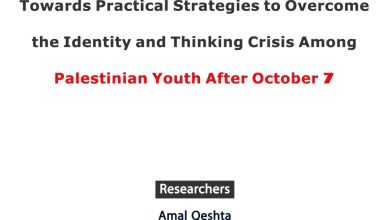“Opportunities, Tools, and Scenarios to influence Israeli Society;” by the researcher, Antoine Shalhat.

Background:
“Building Strategic Capacity: Empowering Civil, Political and Emerging Constituencies in Palestine and Israel” is an EU Peacebuilding Initiative-funded project that develops the ongoing work of the Palestine Strategy Group (PSG), the Palestinian Citizens of Israel Group (PCIG) and the Israeli Strategic Forum (ISF). This roundtable discussion was part of the PSG dimension of the project. Since being founded in 2008, the PSG has produced a considerable number of studies and strategic reports on the Palestinian issue. In cooperation with Pal-Think for Strategic Studies, the Palestinian Center for Israeli Studies (MADAR) and Oxford Research Group, the PSG will produce 12 research papers between 2017 and 2020 which deal with multiple themes and perspectives that then culminates in the publication of the Strategic Policy Manual “Palestine 2020”. This policy report will be presented at a major conference in Ramallah in 2020 and incorporate all the findings of the 12 PSG research papers as well as findings of the PCIG.
Workshop’s Attendees:
The workshop was conducted in the Gaza strip. Attendees included Mr. Omar Sha’aban, head of Pal-Think for Strategic Studies; Mr. Antoine Shalhat, researcher and specialist in Israeli affairs for the Palestinian Forum for Israeli Studies (MADAR) via Skype (Acre); Mr. Akram Attallah, renowned writer from Gaza; and a diverse combination of 60 male and female journalists, writers, analysts and college students which included 44 specialists in Israeli current affairs and 16 specialists in Israeli politics, all from the Gaza Strip. Moreover, 21 of the attendees were less than 30 years old, and 39 of them are above 30 years’ old.
Omar Sha’aban’s Contribution:
Mr. Omar Sha’aban started the session and welcomed all the attendees and noted that Pal-Think is consistently working on what serves the Palestinian issue, to enrich the political Palestinian understanding, and build an effective Palestinian strategy. In addition to this, he referred to the research paper as a very important work, focusing on reading and analyzing the Israeli sparring, related to the available alternatives to compromise with the Palestinians, and its impact on the public opinion in Israel.
Antoine Shalhat’s Contribution:
Mr. Antoine Shalhat stated that his research paper was prepared right after the president of the United States, Donald Trump recognized Jerusalem as the capital of Israel. The paper answers the question: how can we influence the Israeli society through using tools and scenarios to compromise. In addition, Mr. Antoine noted that this paper takes into consideration alternatives and solutions available only within the Israeli society, but not the role of Palestinians in the whole process itself. There is a semi-unanimity that the reaction of the Palestinian Authority to Mr. Trump’s decision regarding Jerusalem, simply means the death of the two-states solution forever, and welcomes the annexation option or any other available alternatives.
A summary of Mr. Shalhat’s research paper:
Mr. Shalhat noted that the given solutions in Israel coincide with the anniversary celebration of 50 years after the war of 1967, which was firstly, a chance to have peace among Israel and Arab countries, and secondly, represented god’s sign that Israel will soon come to an end. However, for the first time, Israelis were able to celebrate this event within the borders of 67, where Israel’s prime minister Benjamin Netanyahu said: “Israelis are now in their own historical state, and will continue be eternally.”
Mr. Shalhat also mentioned that, there are four main alternatives available within the Israeli society,
First, two states for two nations; that option refers to Israel as a nation-state for the Jewish people, and Palestine as a nation-state for the Palestinian people. This is different from the two-states solution for both Palestinians and Israelis. Moreover, it comes in contrast with the idea of one state for all Jewish people around the world, which was proposed by the partition resolution in 1947.
Second, the one-state option, with full sovereignty on Judea and Samaria.
Third, keeping the status-quo as it is. In fact, this is what the current Israeli government does.
Fourth, one state for two nations, one country with open borders between the two parties; Palestinians and Israelis. Although it is considered as a creative, and out of the box alternative, at the same time it’s proposed by limited groups of Israelis.
In addition, Mr. Shalhat noted that the Israeli government does not have any plans within its agenda regarding evacuating Israeli settlers in the West bank and Jerusalem, especially after what the government experienced during the evacuation of Israeli settlers from the Gaza strip in 2005.
Mr. Shalhat added that, the annexation alternative seems to be the most powerful one among other options available. There are two types of annexation that should be differentiated from each other; the first is an annexation which is agreed upon among both parties; Palestinians and Israelis. While the second, is unilateral which means it is only from the Israeli side, without any agreements with the Palestinians.
Mr. Shalhat finalized his summary by saying: “the various alternatives available emphasize that Israel has no practical solutions for the issue. Israel is bullish, particularly with the existence of the Trump administration, which plays a very supportive role and pushes Israel toward imposing more and harder conditions to compromise with the Palestinians. Recently, Mr. Trump himself showed his disagreement with the two-states solution. However, he is going to support any solution, which is agreed upon between the two parties. This is the opposite of what Mr. Obama, and the other previous U.S administrations used to do, they focused their efforts on imposing a solution on the two-conflict parties; Palestinians, and Israelis.
Mr. Akram Attaallah’s Contribution:
Mr. Attaallah has noted the significance of this research paper, and the importance of being up-to-date, with what is going on in the Israeli society. Although the paper focused only on what alternatives there are within the Israeli community, what is crucial for Palestinians is to know how to work towards reaching a compromise with Israelis. Therefore, the paper does not provide answers to the most important question which is ‘how can we influence the public opinion in Israel?’. Actually, that might be because there are no practical tools or enough distance given by the Israelis to the Palestinians. Therefore, we can’t sneak into the Israeli public arena. Most importantly, the paper clarified two main issues; first, that Gaza strip is not a part of the discussion anymore, it is excluded from the Israeli agenda; and second that every available alternative does not take into consideration the Palestinian partner at all. Mainstream thinking in Israel has transferred from being in the hands of generals to the hands of rabbis.
Attendee’s questions and comments:
Attendees stated that the research paper is invaluable, and noted that they are thankful for Pal-Think for strategic studies, and Mr. Shalhat for his efforts. Several questions were asked:
- Adnan (specialist in the Israeli affairs) asked: Why do we talk about the tools that Palestinians can use to influence the public opinion in Israel, but not vice versa? Palestinians are the true owners of the land; Israelis are the colonizers. Therefore, why should we fight for our rights, if those are our rights originally?
- Nevine asked: Does the Palestinian political parties rejection of the idea of influencing the public opinion in Israel simply mean they do not understand how it helps in compromising with the Israelis?
- Ahed commented: The Gaza strip issue is still present on the Israeli government agenda. He also emphasized that the annexation solution is not only the decision of the right-party alone, but it is supported by all parties and groups in Israel now.
- Talal asked: To what extent do we understand the annexation solution? Does it include evacuating Palestinians and / or keeping their demographic existence?
- Wajeeh asked: What does Israeli Palestinians want things to look like? Is it the apartheid, right-party one or the left-party, the one that can be influenced by the Palestinians to reach a peace agreement? Can we accept the annexation solution as a part of the one-state solution?
Mr. Shalhat’s responses to the attendee’s questions:
Mr. Shalhat has emphasized that the annexation alternative is not only the right-party opinion in Israel, but also it is supported by all the various parties and groups in Israel. He also noted that Gaza is still there on the Israeli government table. In addition, he admits that influencing the public opinion in Israel is crucial, because Israel is considered to be ethnocentric democratic state. Therefore, it is not possible to a society like the Israeli one to influence itself. Finally, Judaism is the only religion that does not adopt a missionary approach unlike other religions. As a result, the main goal from the annexation project is to evacuate the Palestinian people, and replace them with Jewish.
“This document has been produced with the financial assistance of the European Union. The contents of this document are the sole responsibility of Pal-Think for Strategic Studies and the Palestine Strategy Group and can under no circumstances be regarded as reflecting the position of the European Union.”


